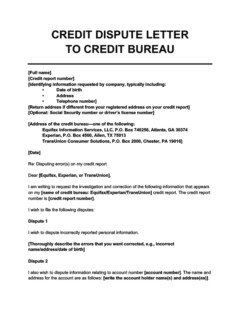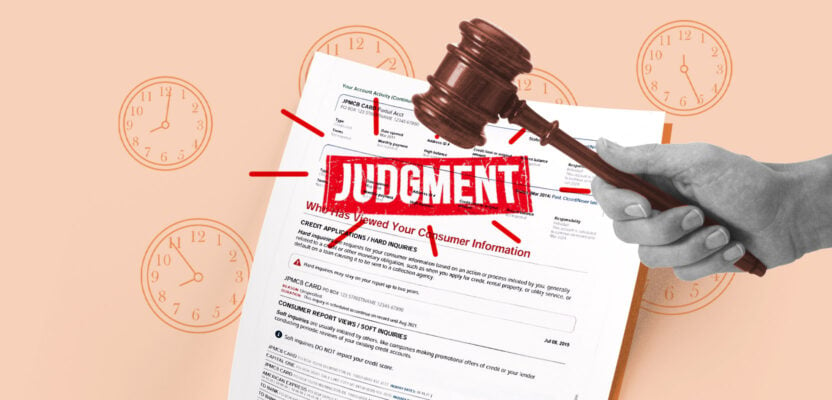If you received a court judgment and you’re worried it’ll damage your credit, then you’re in luck. Although they used to stay on your credit history for up to 7 years (or longer if the statute of limitations hadn’t yet expired), judgments are no longer included in consumer credit reports or factored into credit scores at all. 1 2
However, judgments can impact your life in other ways. Find out how judgments can make it difficult to take out new loans and what to do if you spot a judgment that’s been added to your credit report by mistake.
Table of Contents
Why do judgments no longer appear on credit reports?
Judgments, which are court rulings that settle a lawsuit, no longer appear on credit reports. This is because of the National Consumer Assistance Plan (NCAP), which was introduced by the three credit reporting agencies (Experian, Equifax, and TransUnion) in 2015. 3
This plan was part of a settlement agreement following a lawsuit between the three main credit bureaus and 32 state attorneys general. The plan’s goal is to improve the accuracy of credit reporting and make it easier for consumers to dispute errors on their credit reports. 4
The NCAP limits how public records (e.g., civil judgments, state tax liens, and federal tax liens) can appear on credit reports. Currently, the only public records that still appear on credit reports are bankruptcies. 2 Civil judgments and tax liens never appear.
What information is actually included on your credit report?
Even though judgments won’t show up on your credit report, plenty of other personal information will. Here’s a quick overview of what your credit report shows:
- Personal identifying information: Your name, address, phone number, date of birth, Social Security number, current employer, your spouse’s name, and the name of any coapplicants associated with your credit accounts.
- Account information: The different types of credit accounts you have, such as credit cards (which are known revolving credit accounts) or installment loans. Your report will also show each account’s payment history, current debt amount, opening date, and credit limit. If you have any debts that have been sent to debt collectors, they’ll also appear here as “collection accounts.”
- Credit inquiries: This includes soft and hard inquiries, which occur when someone checks your credit.
- Public records: As mentioned, currently only bankruptcies will show up on your credit report. 5
What should you do if you find a judgment on your credit report?
If you find a judgment on your credit report, you should dispute it immediately. This is the only way to remove a judgment from your credit report. You can do so by sending a dispute letter and supporting documents to the credit bureau(s) that reported it.
Create your letter using the free downloadable template below.

Credit Dispute Letter to a Credit Bureau
Use this credit dispute letter template to file a dispute directly with one of the credit bureaus. If you have a court judgment on your credit report, you should always dispute it—the bureaus almost certainly included it by mistake.
How judgments can still affect your loan options
Even though judgments won’t appear in your credit file, they’re still a matter of public record. This means that lenders will be able to see your judgment if they run a more intensive background check on you when you apply for a credit card or loan (i.e., one that goes beyond merely running a credit check).
If you apply for a major loan, such as a mortgage, you can expect your prospective lender to run a full background check and in-depth assessment of your finances. 6 Unpaid judgments might cause them to reject your application.
To be eligible for certain government-backed loans, such as FHA and USDA loans, you’ll need to pay off your judgment before applying or provide a letter of explanation. Otherwise you’ll face automatic disqualification. 7 8
How to avoid getting a judgment in the first place
Obviously, the best way to avoid getting a judgment is to simply pay off all of your debts. If your finances are strained and you’re concerned you can’t pay, communicate with whoever owns your debt as soon as possible to explain your situation.
Your lender will probably be willing to negotiate with you rather than escalating to a lawsuit (which would be time-consuming and expensive for them too).
Never ignore debt collectors or creditors who are calling you about payments unless you’re sure that your debt is past the statute of limitations (in which case you can’t be sued over the debt and consequently can’t receive a court judgment).
Strategies to get out of debt and avoid lawsuits
If you’re having trouble coping with your debt, you can try these approaches to avoid a judgment:
- Explore debt relief solutions: Paying off what you owe might seem impossible, but don’t rule it out as an option before exploring tried and tested methods for getting out of debt. There are plenty of tools (such as balance transfers and debt consolidation loans) that can make paying much easier.
- Negotiate with your creditor or debt collector: Try negotiating with debt collectors to see whether they’ll agree to a debt settlement or repayment plan that fits your budget. Most would happily avoid the hassle and expenses of a lawsuit if they knew you were willing to make payments voluntarily.
- Discharge your debts through bankruptcy: You won’t get sued over debt that you’ve cleared through bankruptcy. 9 However, bear in mind that bankruptcies can stay on your credit report for up to 10 years and cause lasting damage to your credit score, so this is an option of last resort.
What to do if you’re already facing a lawsuit
If you’re already getting sued over a debt, don’t ignore the court summons—make sure to show up. By not appearing, you might lose the case by default (even if the debt is time-barred or you’re confident you’ll win the lawsuit for other reasons).
Your best option is to hire an attorney that specializes in consumer debt. They’ll discuss your rights and options and help you chart the best course of action.
Takeaway: Judgments should no longer appear on your credit report, but they can disqualify you from getting credit anyway.
- Judgments used to stay on credit reports for 7 years or longer, but they haven’t been included in credit reports since 2017.
- The only public record that can still show up on your credit report is bankruptcy.
- Although judgments won’t show up on your credit report, they’re still public records that lenders may see when you apply for a loan.
- You can remove any judgments on your credit report by filing a dispute with the credit bureau that reported it.
- To avoid getting a judgment, contact your creditor or debt collector as soon as possible to negotiate repayment or debt settlement. As a last resort, you can file for bankruptcy.







